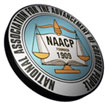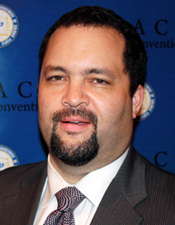FCNNEWSSOURCE
NAACP leader shares thoughts on present, future challenges

The National Association for the Advancement of Colored People (NAACP) held its 102nd Annual Convention at the Los Angeles Convention Center, July 23-28.Its theme was “Affirming America’s Promise” of life, liberty, the pursuit of happiness, justice, hope, fair play, equality, change, and opportunity. Benjamin Todd Jealous, president and CEO, sat down with Final Call national correspondent Charlene Muhammad for a brief interview about key issues the NAACP is targeting as it moves into its second century of existence.
Charlene Muhammad, Final Call Newspaper (FCN): By the time of our publishing this issue, you will have ended your 102nd Annual Convention. What do you want people to understand about the NAACP and where it is today?

Benjamin Todd Jealous (BJ): We are strong and growing stronger by the day. In the past three years we’ve seen our online activists surge from 170,000 to start in 2008 to over a half million today. We’ve seen our individual donors and people who write checks apart from membership increase from less than $20,000 then to more than $100,000 now. We’ve seen our membership increase 12 percent to 230,000 today, so we’re a family of hundreds and hundreds of thousands of activists who work together, online and in the streets in more than 1,200 communities across the country to ensure that in these tough times, when our voting rights are under attack, when the American dream itself is under attack, that our communities are well organized, well represented and engaged.
FCN: Let’s talk about President Barack Obama, who is also under attack. He’s considered one of the visible triumphs of the civil rights movement as the first Black president. Those loyal to him see any critique or criticism of him as an attack, and then there are people who are attacking him outright. What do you make of these different debates going on about the president and the impact of the Tea Party on those debates, and the political impact the Tea Party has had and continues to have?
BJ: Dr. (Martin Luther) King talked about southern obstructionists and interposition and nullification. We are living through one of those moments when our civic lessons we learned as children are important to remember. Congress holds the purse. There will be no major jobs program in this country until Congress decides to appropriate funds and we’ve seen just the opposite. They’ve continued to cut taxes to actually decrease federal revenues. That has put the president in a box. It is clear the president would like to see the government do more to shore up local governments, do more to create jobs, but because of this tidal wave of obstructionism that has come into the U.S. House of Representatives, the options are very limited. In this moment, our attack in dealing with the administration has been to focus more on eradicating discrimination because that’s something that he does have control over. That is the responsibility of the executive branch. So, when Morial (Marc Morial, president and CEO, National Urban League) went in there, we certainly made the case that we’re making to leaders in Congress. We also made clear that we understood where the obstruction lies in our government right now, in the House of Representatives, but we encouraged him and he agreed to do everything the administration could to both deal with what you might refer to Employment Discrimination 1.0–gender discrimination, racial discrimination, age discrimination–and Employment Discrimination 2.0. ***image3***
There are types of discrimination that has cropped up and really all gone through the roof during the recession that tend to reinforce Employment Discrimination 1.0 and that’s discrimination based on credit score. People are literally being discriminated against on whether or not they get a job based on having low credit. How does a person improve their credit if they can’t get a job? Also, long term unemployment; people are figuring out that they’re being turned down for jobs because people say, ‘Well, you’ve been unemployed too long.’We’ve had years now of some of the worst unemployment numbers in the past century and certainly the worst since the Great Depression and again, how are they expected to change their status of being unemployed if we won’t give them a job?
And finally, there’s discrimination against formerly incarcerated people. We’re a country that believes in second chances. We believe work is redemptive, and yet, we ended up trapping literally thousands upon thousands of children in foster care because we won’t let their mothers work when they’ve returned from paying their debt to society in prison. Frankly, often having gone to prison when they shouldn’t have because they should have gone to rehab. It is non-violent drug offenders even who are unable to find work when they return and as a result, their kids stay in foster care because you don’t get your kids back when you get out of prison. You get your kids back when get out of prison and you find a job.
FCN: The defamation lawsuit of former USDA director Shirley Sherrod against blogger Andrew Breitbart is at trial. The NAACP in some aspects and yourself personally, as a leader, has been criticized by some people regarding its role. Was it a knee-jerk reaction as some have said and how has the NAACP bounced back, or is bounced back a correct characterization of it?
BJ: We were the last to make the error of the USDA and the White House. We were the first to correct it and we did so in less than 24-hours. We put up the video, which we had to track down in rural Georgia and get to Washington, and get up. That frankly then spurred everybody else to take the actions that they took to apologize and seek to make amends. The true test of leadership is not whether or not you make mistakes, but whether you’re quick to recognize them and how quickly you make amends for them. Unfortunately, we’re all human. We’re not perfect. We’re proud that we quickly recognized our mistake. That we made amends for it in the same day and that we were successfully able to push others to do the same thing.
FCN: Thank you.












